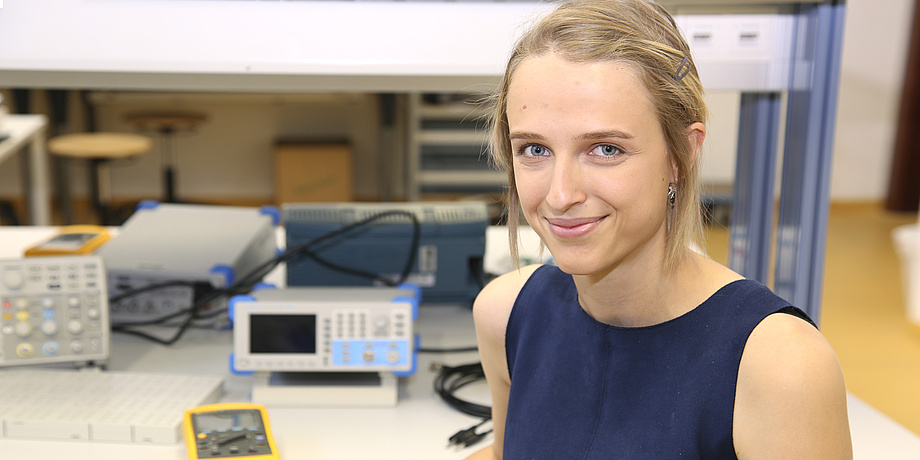What do you particularly like about your degree programme? What fascinates you about the subject matter?
Sophie Steger: You encounter electrical engineering all around you in everyday life. Mobile networks, for example, have become quite normal for us and we do normally not worry about how it works. In my classes, however, I get to know how it works and that gives these things a lot more depth, which I find very exciting. I get to know and understand the world around me better. I also like the way mathematics can describe everything so elegantly and beautifully. The degree programme is even more varied than I initially thought.
What was the beginning of your studies like for you?
Sophie Steger: I attended a grammar school with a focus on languages and multimedia, and initially planned on studying physics. In physics class, I liked the parts about electricity the best, so I enrolled in electrical engineering. Right from the start, I found everything absolutely fascinating. Initially, I really only found it difficult to keep up in areas where practical and prior knowledge are beneficial. In mathematics, on the other hand, which is sometimes seen as a hurdle, we started the first class with the four basic arithmetical operations, and everything after that was logically structured and comprehensible. My knowledge from school was completely sufficient. This mathematics and theoretical part was especially good fun for me. Quickly, just to dispel a myth: this degree programme is definitely feasible even if you did not attend a higher technical education institute. Sometimes this may even be an advantage because you study all subjects starting from the basics and build on that, as the curriculum recommends.
Of course, I was nervous at the beginning of my studies: a new city, a completely new environment, and I thought the others were already better at everything than me. But I learned that's how it is for many students from conversations. In the end, I found my way around quickly, formed learning groups and built up a circle of friends. Everything works a lot better and easier as a team.
Were there any challenges for you at the beginning of your studies and how did you master them?
Sophie Steger: In retrospect, the first programming lecture and exercise was the most difficult challenge for me. Thanks to a lot of hard work and practice as well as learning from friends, I managed that without any problems. The online services of TU Graz, such as the video portal TUbe, were also a great help to me: I simply looked at the recorded programming lectures and was always well prepared.
What makes a good electrical engineer?
Sophie Steger: A passion and motivation for solving problems. I do not think you have to be a genius as long as you enjoy it and are curious and diligent. I believe diligence really gets you ahead in life. And practise makes perfect even in the lab: In the beginning, I was especially lacking in practical experience. So, I practiced until I could complete the tasks.
Would you like to specialise in a specific area in the master's programme?
Sophie Steger: I would like to deepen my knowledge of information and communication technology in my master's programme. I do not yet know, however, in which specific subject area exactly. I'll see what I am most interested in next semester.
Do you have any idea what you would like to do for a living?
Sophie Steger: I can see myself staying at the university and being involved in teaching. Even now, working as a teaching assistant in the laboratory of the Institute of Fundamentals and Theory in Electrical Engineering makes me very happy. I supervise students, explain the exercises and the equipment there, and also give input for theory questions. As far as my professional orientation is concerned, I am relatively open. There are still a few semesters of my degree programme waiting for me until I can apply for the doctoral programme. Judging by the way things are going, I can also imagine staying in Graz.
Do you have a favourite place at TU Graz? And what does your everyday study life look like?
Sophie Steger: Outside of classes, I like to sit in the Campus Inffeldgasse Mensa canteen with my friends, it is our favourite place. We all have different specialisations, but we all get together again at the Mensa. For studying and working, we meet at the individual institutes or in the study centre at Campus Inffeldgasse. Quite often, we spend the whole day from morning to evening at the university, but there is still enough time for friendships and hobbies. I love handicraft and hiking, since I can get out of my head with these activities. I also take language classes as a counterbalance.
How is being a student in Graz? What do you especially like about Graz?
Sophie Steger: I am originally from South Tyrol and think Graz is a beautiful city to live and study. Graz is not too big, I can bike or walk everywhere quickly, and it’s easy to leave the busy city behind and enjoy some nature. I like to go for a drink with my friends in the evening, since there are plenty of pubs and bars to choose from in the city. And I also wouldn’t want to miss Campus Inffeldgasse: Once lectures are over, there are often great parties there. I think Graz is an ideal city for students.

